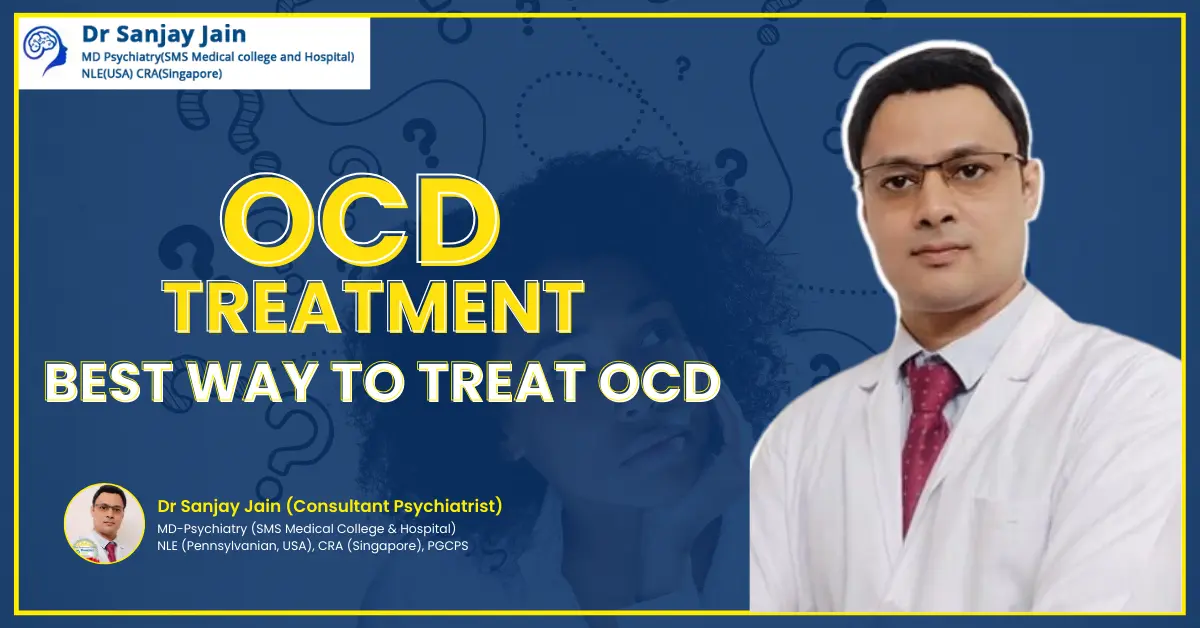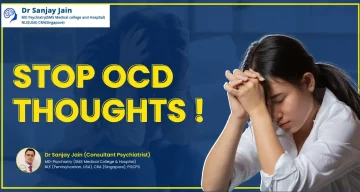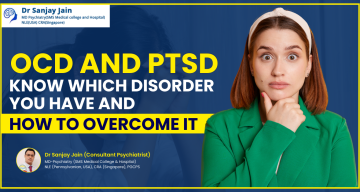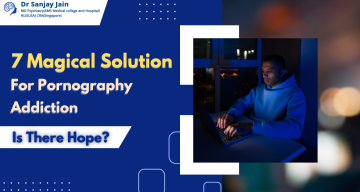
Identifying OCD Symptoms and Causes: Dr. Sanjay Jain’s Expert Approach in India
Do you suffer from OCD? Is finding the best OCD treatment in India something you’ve been slaving away at?
Everyday life can be significantly affected by the repetitive cycle of intrusive thoughts and compulsive actions that characterize Obsessive-Compulsive Disorder (OCD). But there is hope, and getting the correct therapy is critical for controlling the illness.
All You Need to Know About Best OCD Treatment in India:
In this blog, we will discuss all about OCD and what are the symptoms and causes of OCD. But before knowing about treatment you should know about what type of symptoms an OCD patient has and how to recognize it. Also, we discuss problems that are associated with OCD. In conclusion, you will know which is the best OCD Treatment in India.
The Common Symptoms of OCD:
The defining symptom of OCD is intrusive, unpleasant thoughts that refuse to go away. Obsessions often lead to compulsions, which are mental acts or repetitive behaviors. Understanding these symptoms is essential to identifying and treating the disease correctly.
Obsession Symptoms of OCD:
Those afflicted with OCD endure a life-altering pattern of intrusive, repetitive thoughts and actions. For the identification and treatment of OCD in India, it is essential to comprehend the complexities of obsessive symptoms.
- Distressing Intrusive Thoughts:
Obsession symptoms of OCD include thoughts that are both disturbing and intrusive, which can lead to unwanted behaviors. These include constant, unwelcome, and highly stressful thoughts. The specifics of these thoughts differ significantly from person to person but worries about becoming sick or hurting other people seem to surface often. A preoccupation with symmetry and an intense need for structure are additional symptoms.
- Fear of Contamination:
Extreme dread of contamination is a common phobia among people with obsessive-compulsive disorder. A fear of germs, filth, or being sick could become an obsession. Some people with this anxiety may engage in obsessive activities like washing their hands excessively or avoiding places they feel are filthy.
- Fear of Harming Others:
An obsessive fear of hurting other people is another common fixation. People could have disturbing nightmares about inadvertently harming others they care about. Anxiety levels might rise, and the impulse to engage in harmful, repetitive activities could become overwhelming.
- Concerns about Symmetry:
A preoccupation with straight lines and even numbers is a common symptom of obsessive-compulsive disorder. The pursuit of equilibrium and perfection can devour certain people. As a result, you may be preoccupied with ideas of imbalance, which can severely impact your quality of life.
- Obsessive Need for Orderliness:
A recurrent motif in Obsessive-Compulsive Disorder is the compulsive demand for order. To alleviate the stress of being afraid of chaos, some people feel forced to organize their belongings in a certain way or adhere to strict schedules. Anxiety and discomfort might worsen if you don’t follow these routines.
Compulsive Symptoms of OCD:
The second part of OCD is compulsions, which are mental activities or repetitive behaviors done to alleviate the anguish that obsessions produce. Even while these actions could alleviate your symptoms for a while, they make your obsessive-compulsive disorder symptoms worse. As such, getting OCD best treatment in India becomes imperative.
- Repetitive Behaviors:
Repetitive actions that people feel forced to carry out are a common symptom of compulsions. People engage in these actions to cope with the stress these ideas cause. Some examples of everyday compulsive activities include washing one’s hands repeatedly, checking and double-checking one’s locks, or fixating on a specific pattern of item arrangement.
- Ritualistic Actions:
Obsession-related anxieties can cause people to experience ritualistic compulsions. In these, they feel forced to do a preset series of actions. These rites of passage can cause significant disruptions to daily life and take a lot of time.
- Excessive Cleaning:
Excessive cleaning is a prominent habit in Obsessive-Compulsive Disorder. People may clean for lengthy periods and do it repeatedly because they are so afraid of being dirty. They do it because they think it will help them avoid potentially harmful bacteria or other pollutants.
- Checking and Counting:
Some people with Obsessive-Compulsive Disorder (OCD) have counting compulsions, where they count things, check that appliances are off, or make sure doors are closed. The necessity to avoid damage or assuage excessive anxiety motivates these behaviors.
- Repeating Actions:
Some people with obsessive-compulsive disorder (OCD) repeat behaviors to a finer or more exacting degree than others. To develop control and alleviate the anxiety caused by obsessive thoughts, patients go through this repetition.
Problems That are Associated With OCD:
Having to deal with intrusive thoughts and repetitive actions is only the beginning of the difficulties that come with living with Obsessive-Compulsive Disorder.
A person’s life is affected by the disorder in many ways, and getting OCD best treatment in India is essential. Not treating it can cause a cascade of problems that impact relationships, careers, and quality of life in general.
- Strained Relationships
One thing that immediately stands out about OCD is how badly it hurts relationships. When someone is constantly uncomfortable, their habits and compulsions can affect their relationships with friends, family, and sexual partners.
Loved ones may find it hard to understand how irrational an OCD sufferer’s habits and routines that don’t seem to have any purpose are. It can intensify a person’s sense of isolation due to strained communication and emotional distance caused by this lack of understanding.
- Impact on Work and Productivity
People with OCD often act intrusively at work, which can make people less productive and unhappy at work. It might get boring to have to do the same things over and over again. Concentration is difficult for persons with OCD.
Increased absenteeism, trouble meeting deadlines, and difficulties maintaining professional connections may arise from the anxiety linked to untreated or poorly controlled OCD. It, in turn, may put one’s professional and financial futures at risk.
- Disruptions in Daily Activities
Individuals with OCD frequently find themselves indulging in time-consuming and cognitively complex compulsions. These behaviors can seriously impede daily tasks. These include counting things, cleaning hands, and checking locks.
Even seemingly insignificant things can cause a great deal of tension and anxiety in someone who has OCD. Those who find life a never-ending series of challenges may develop chronic delays, appointment cancellations, and frustration. Thus, seeking the treatment of OCD in India becomes essential.
- Psychological Toll on Quality of Life
Because OCD affects so many people, it can really hurt their overall health. The never-ending battle against OCD thinking and the need to do OCD routines could lead to anxiety, depression, and a general decline in health.
Read Also: How Does Personality Change After Depression: Understanding The Impact
People who have chronic mental illness may never know the happiness and contentment that other people take for granted. Isolation and despair may set in as a result.
- Stigma and Social Challenges
In addition to their internal problems, individuals with obsessive-compulsive disorder may face extra exterior challenges due to the societal stigma associated with mental health conditions.
Misunderstandings about the illness may lead to prejudice and discrimination in one’s personal and professional life. People who are scared to admit they are unwell could not receive the necessary care. If this occurs, obsessive-compulsive disorder problems might worsen significantly.
Read Also: How To Overcome From OCD: 5 Simple Tips Of Experts
Taking Help from Dr. Sanjay Jain
Finding the correct expert advice is critical for successful treatment in mental health. Jaipur is home to renowned psychiatrist and psychologist Dr. Sanjay Jain. His stellar educational credentials, which include an MBBS and an MD in psychiatry from Jaipur’s SMS Medical College and Hospital, make him stand out.
He has worked in this field for over 13 years and has significantly impacted worldwide. In addition to his work with Bracket Neurosciences in Pennsylvania, USA, he has participated in international research investigations in Singapore.
In 2020, Dr. Jain was named the best psychiatrist in Jaipur by threebestrated.com. His dedication to patient-centered therapy surpasses traditional approaches. Psychoeducation, several therapeutic modalities, and behavioral modifications are all part of his approach.
The need for a team effort and individual attention in mental health treatment is something he stresses. Attaining long-term success in the treatment of OCD in India requires a patient-centered approach that cultivates a sense of agency and control.
Read Also: Understanding The Difference Between OCD And PTSD
Conclusion: Best OCD Treatment in India
People who want to find the best OCD treatment in India should look at Dr. Sanjay Jain (Best Psychiatrist in India). Because he is famous worldwide and knows a lot about mental health care, he is seen as an expert in the field. Contacting Dr. Sanjay Jain may be the initial stride toward a more powerful and satisfying life for you or a loved one coping with Obsessive-Compulsive Disorder.

Dr. Sanjay Jain is a highly qualified and one of the best psychiatrist in Jaipur, India, with over 13 years of experience. He earned his medical degrees from SMS Medical College and Hospital. Dr. Jain is known for his global research work on mental health. He believes in not just using medicine but also educating and working with patients to find the best treatment plan. He was recognized as one of Jaipur’s top psychiatrists in 2020 by threebestrated.com, a trusted US-based ranking company.




Leave a comment